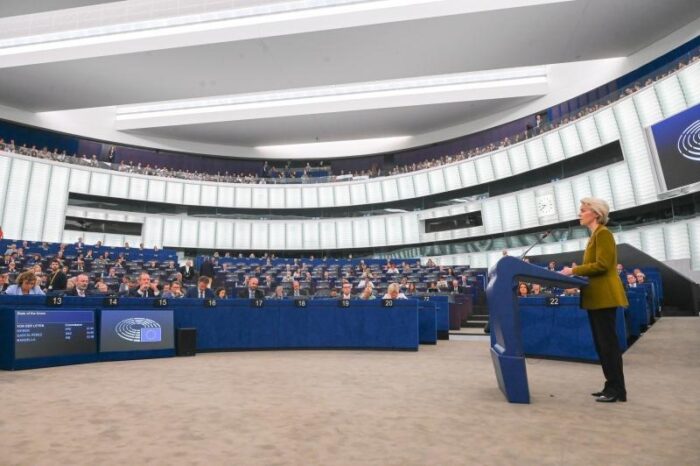The Progressive Post
How lawmakers abandoned local newspapers and killed media plurality

Around the world, local news publishers vanished. In the space of 20 years, news publishers saw their share of the advertising market drop from 93 percent to 8.34 percent. Legislators looked the other way and killed media plurality with their laissez-faire approach. Member of the European Parliament Paul Tang argues that we need to ensure competition within the advertising market.
In early 2019, The Economist ran the headline: ‘Competition, not break-up, is the cure for tech giants’ dominance’. Not a surprising angle for the liberal newspaper. However, given that breaking up the tech giants is not yet an option, breaking them open is a potent alternative. Indeed, competition will reduce their dominance and our dependence on the big platforms for social media. If we want our media to flourish, we need to institutionalise the value of media plurality in all our legislative efforts governing the digital world. This starts with competition.
Over the past 20 years, we’ve seen a steep increase in the market power of a few big tech companies. The acronym GAFAM covers five of the six largest companies worldwide in terms of market capitalisation. Google, Apple, the company formerly known as Facebook, Amazon and Microsoft are known not only to every pupil, but also to every older person. Nowadays, half of all Americans are using social media as their main source for news.
The US has seen a decrease of 39 per cent in the circulation of newspapers (both print and digital), from its peak in 1990 to today. Since around 2004, one fourth of all newspapers that existed at that time in the United States have vanished. The lion’s share of these were local newspapers. The story in Europe is similar. These figures make one thing very clear: the newspaper landscape has changed significantly.
The aim of this article is not simply to claim the new social media has led public discourse to deteriorate, as a result of a perverse business model that seeks to gain and keep the public‘s attention by offering up a menu of disagreement and anger. This article also underlines that the traditional media, with its editorial freedom and broad plurality, has been the principal victim of this business model.
Following Google’s introduction of its AdWords service in 2000 and after Mark Zuckerberg introduced Facebook Ads in 2007, each company quickly offered interesting propositions for marketers seeking to profit from the innovative rise of online platforms in the early 2000s. AdWords and Facebook Ads not only gave their clients the opportunity to buy advertising space on their platforms and third-party sites, but also promised to adapt each advertisement to the interests of the user seeing the ad.
Based on the promise of results superior to those of their less advanced predecessors, tracking-ads became the global standards for marketers. Digital advertising spending rose in Europe from €7.7 billion in 2006 to €69.4 billion in 2020, accounting for 56.5 per cent of total advertising spending. All to the detriment of newspaper publishers, who in 2003 were responsible for 93 per cent of all advertising and in 2020 saw their revenue and market share drop to 8.34 per cent.
How did this happen? Were publishers stuck in their traditional ways of producing and presenting news and simply not innovative enough to participate in the early 2000s internet bubble? That may well be right. Nonetheless, were they given a fair opportunity to compete with tech companies? I don’t think so. Google and Facebook created with their new advertising methods a perverse business model, which centres around gaining attention but which also allowed them to build and maintain a dominant position in the markets for personalised ads.
To sell more ads, they convinced both small merchants and the bigger fish that their tools were able to grasp the maximum attention of platform users by taking very personal data and targeting ads based on that data. The famous Harvard professor Zuboff calls this the source of “surveillance advertising”. By tracking users all over the web, on their own sites and on third-party websites, Facebook and Google go further than Orwell ever could have imagined. These methods contravene our human rights of privacy and data protection.
The tracking-ads are sold in opaque, automated, real-time bidding systems. These systems allow a marketer eager to promote their product to bid on an ’empty’ digital advertising space and on the user which should see the product. It sounds quite exciting, but the results are sketchy. The marketer very often doesn’t know where the ad ends up. Thanks to these opaque systems, no scrutiny takes place on these advertising markets. Only the owners of the data have access to the sets of data which prove the effectiveness of the advertising. With heavily exaggerated reports and marketing pitches, Facebook and Google succeed in convincing marketers of the superiority of their product. News publishers have also fallen for this sweet talk and by doing so not only funded their competitors, but also gave away their exclusive audiences. Simply visiting the website of The Guardian leads to 159 tracking requests, mostly referring to Google and Facebook. Which makes this newspaper not the only paper no longer able to sell advertising to its own readers.
On top of this, researchers from the universities of Minnesota and California found that the financial benefits of tracking-ads compared to neutral ads have been greatly exaggerated. Some corporations, like P&G and Ebay, stopped spending on digital ads. They noticed that nothing happened with their sales numbers. So-called contextual advertising, which doesn’t focus on the user looking at the ad but rather on the place where the ad is shown, seems to yield much better results. Dutch public broadcaster Ster saw an increase in advertising revenue of 149 per cent when it replaced tracking-based ads with contextual-based ads. A Norwegian news publishing group earned 391 per cent more by using contextual ads instead of tracking.
So why are most businesses and news publishers still using tracking-ads? There is an easy answer: they are trapped within the systems of Facebook and Google. They have given their customers’ data to the tech giants and in return received ’embedded’ employees of the Silicon Valley companies ‘helping’ them to use their services. Stopping using the current system makes your former ally your new foe.
This dependence comes at a steep price. As the ‘middlemen’, Google and Facebook take in this process between 50 and 70 cents in each euro spent, while their system enables advertising fraud. Fake websites and fake advertiser accounts earned $45 billion last year. In 2023, this will peak at $100 billion, according to the advertising umbrella organisation. This would make ad fraud the second-largest form of criminality worldwide.
That’s why there is need for more competition. The 50 to 70 per cent market share of Google and Facebook in the digital advertising market gives them simply a duopoly. They are owners of gigantic sets of illegitimately collected personal data, and no news publisher can fairly compete. The only way to enable competition is by limiting the use of personal data for advertising. A ban on tracking-ads could be that solution.
In the 2020 Digital Markets Act (DMA), Europe aims to curb the market power of the largest tech giants. The DMA focuses on the excesses of the market dominance of a few platforms. The largest and most significant businesses, like Meta (Facebook), Alphabet (Google), Apple and Amazon, will be governed by this law. These so-called gatekeepers need to abide by 17 obligations and prohibitions. All inspired by earlier competition cases with the aim being to prevent the abuse of market dominance.
Currently the EU Parliament and the Council are putting the finishing touches to their positions before the joint negotiations get underway. However, a strong stance on tracking-ads and media plurality is important. If we really want to have local media and independent newspapers, we need to draft dedicated provisions to help them.
It is not only commercial entities that will benefit from increased competition. Press publishers around the world are in need of greater income to survive. If we let social media grow to such an extent that it becomes the only source of news distribution, we will be putting our democracies and culture at risk. Let us create a level playing field in the advertising market by limiting and banning the tracking and targeting of internet users.
Photo credits: Koshiro K/Shutterstock




